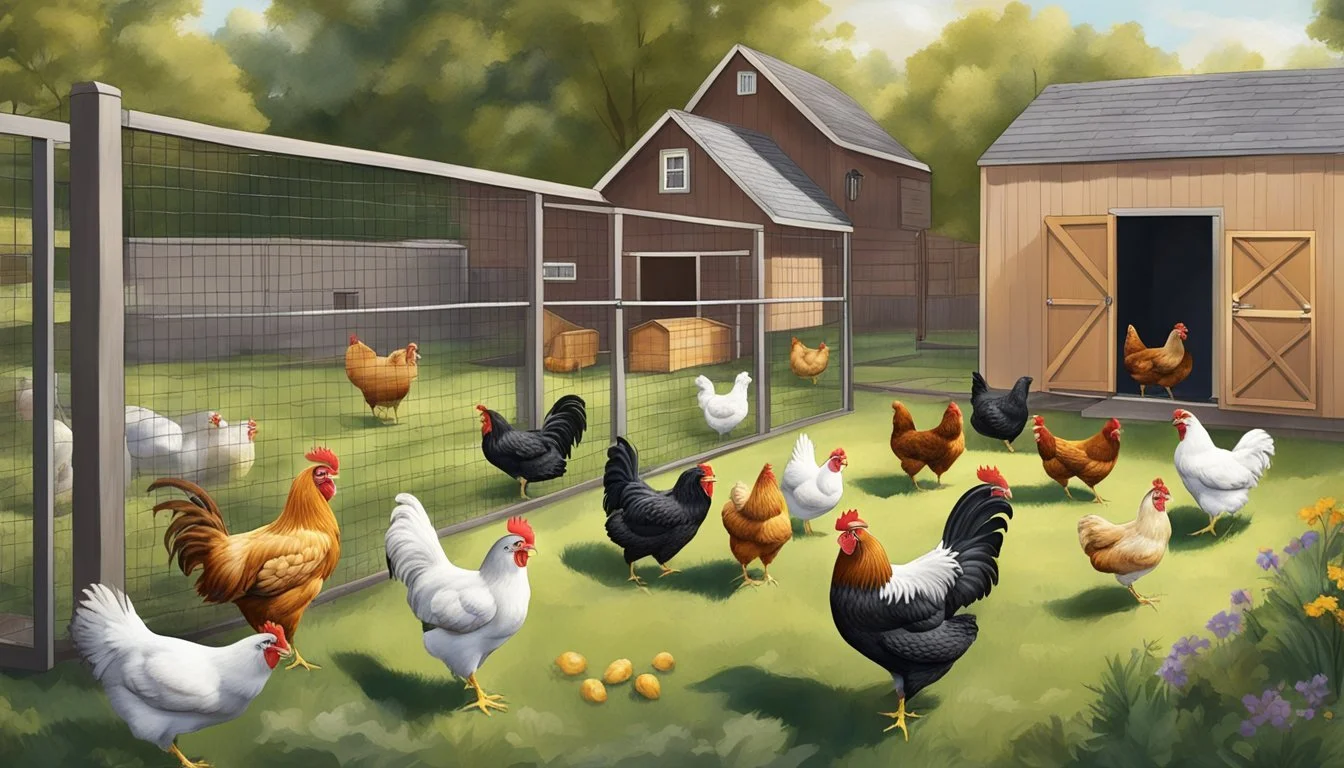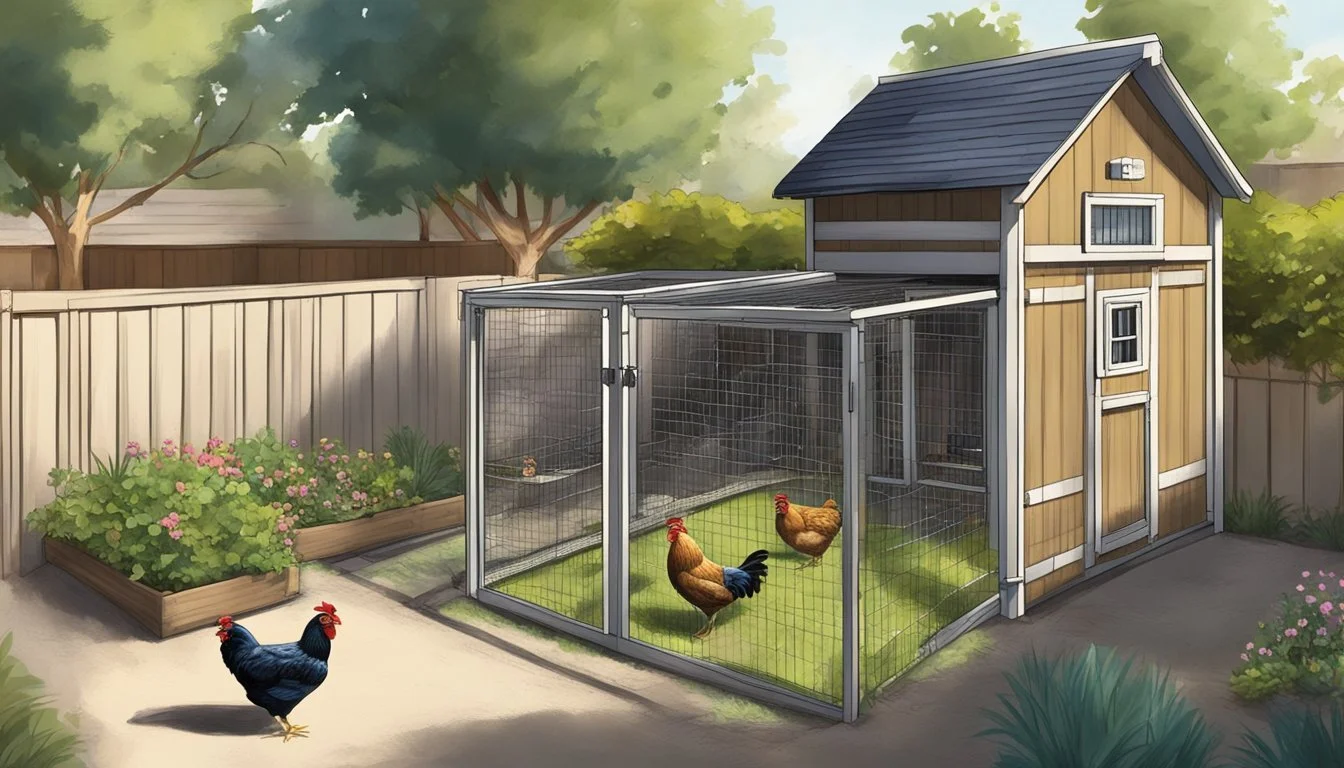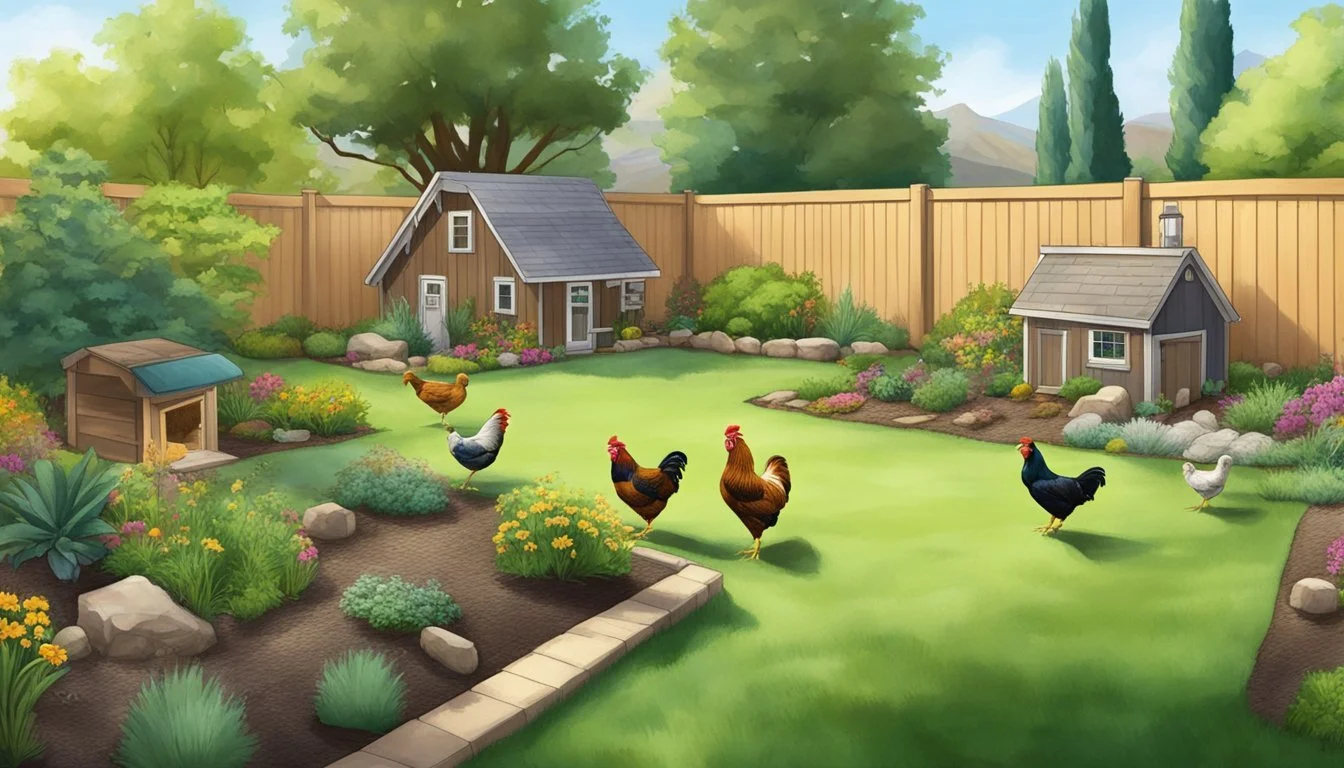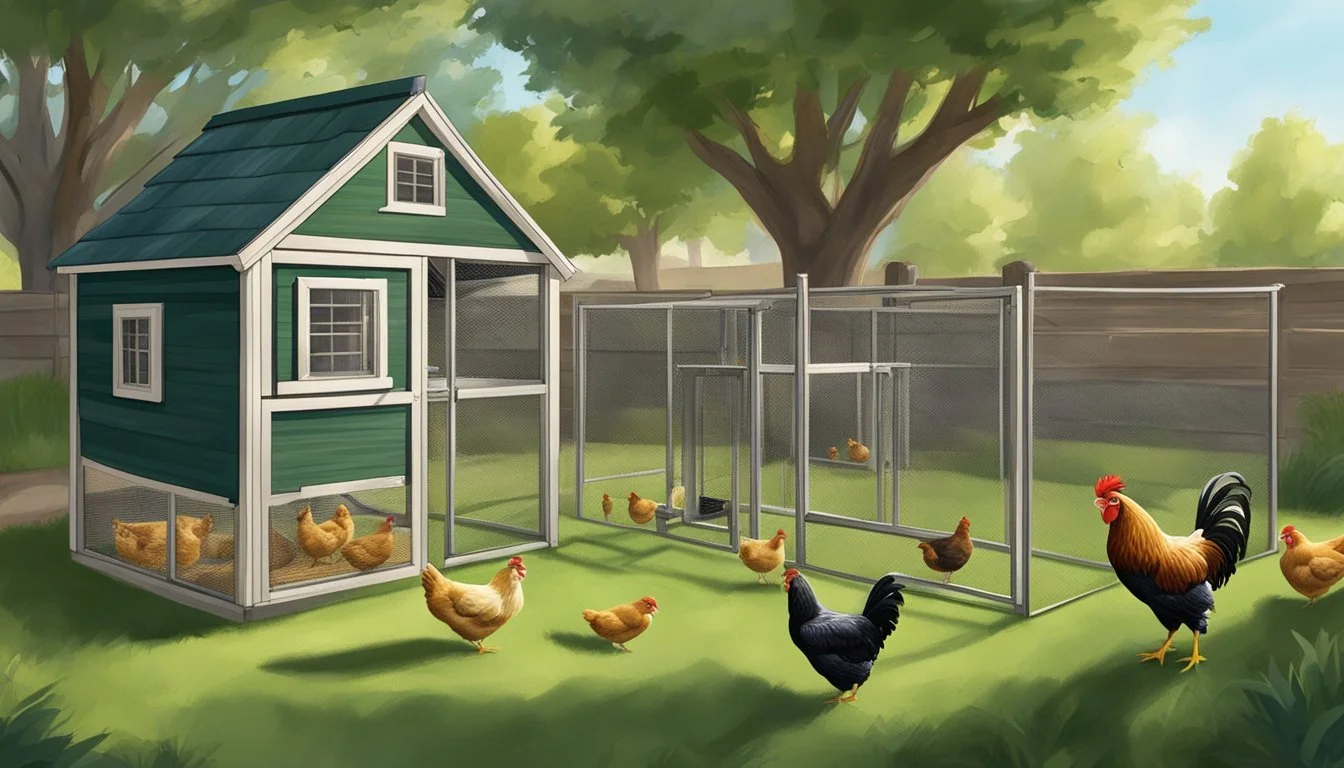Keeping Backyard Chickens in Sparks, NV
Essential Tips for Urban Poultry Farming
In Sparks, Nevada, the urban landscape has evolved to embrace the trend of keeping backyard chickens. This movement aligns with a wider interest in sustainable living practices and local food production. As a result of this shift, the city updated its ordinances in October 2015, allowing residents to enjoy the benefits of raising hens on their properties, marking a significant change in the city's urban agriculture laws.
Residents of Sparks have specific guidelines to follow when it comes to backyard chicken keeping. The number of hens one can keep is dependent on the size of their property; smaller parcels can host fewer chickens, ensuring animal welfare and neighborhood harmony. While hens are welcome, it is important to note that roosters are not permitted within city limits to minimize noise complaints.
Keeping backyard chickens in Sparks not only offers fresh eggs but also contributes to a green lifestyle, providing organic waste management through composting and natural fertilizer for gardens. The city's alignment with urban agriculture initiatives reflects a commitment to fostering community engagement with food production and environmental education.
Understanding Local Chicken Laws
In Sparks, Nevada, careful attention to local ordinances and state regulations is vital for residents interested in keeping backyard chickens. This section outlines the crucial legal aspects and procedures to ensure compliance.
Sparks Chicken Ordinance
The City of Sparks requires that chicken coops be at least 5 feet from any property line, situated within the rear yard, and maintain a 10-foot setback from the main dwelling. They emphasize that the coop must remain clean and odor-free. The specific number of chickens allowed can vary, and residents should contact Sparks officials for the latest updates.
Nevada State and Washoe County Regulations
State and county laws complement city ordinances. While Sparks has its specific regulations, it's essential to also adhere to the broader Washoe County and Nevada State laws concerning urban agriculture which may cover aspects of animal welfare, noise, and health codes.
Comparative Study of Local Ordinances
Comparing Sparks' laws with nearby jurisdictions, such as Reno, Carson City, Henderson, Las Vegas, and North Las Vegas, reveals that while the basics of urban chicken keeping are similar, details, like the permissible number of chickens and coop placement, can differ significantly.
Penalties and Legal Concerns
Non-compliance with chicken laws in Sparks can lead to fines or legal action. Residents must understand the responsibility that comes with urban chicken keeping to avoid such penalties.
Allied Permits and Regulations
In addition to chicken-specific rules, prospective owners may need to navigate regulations concerning other types of urban agriculture, such as keeping bees, rabbits, or pigs. Permits may be necessary in some instances.
Navigating Zoning Laws
Zoning laws are key to determining if residents can keep chickens. The City of Sparks has zoning districts that stipulate various uses. Residents should verify that their property is zoned accordingly for keeping backyard chickens.
Permit Application Process
Should a permit be required, Sparks residents must file an application with the city, which involves paperwork submission and possibly a fee. The specifics of the permit process, including timelines and requirements, are typically available through the city’s official channels.
Exemptions to Ordinances
There could be exemptions to the typical ordinances. These exemptions might relate to property size, the historical presence of animals, or other unique situations. It is advisable to inquire directly with city officials about any potential for exemptions.
Preparation for Raising Chickens
Before embarking on the venture of raising backyard chickens, prospective poultry keepers should understand the importance of selecting appropriate breeds, meeting basic chicken care requirements, ensuring sufficient space, and establishing a secure and well-equipped coop.
Choosing the Right Breed
When deciding to raise chickens, selecting a breed that matches the intended purpose—whether for egg production, meat, or as pets—is crucial. Some breeds are better suited for colder climates, while others thrive in warmer areas. For example, the Plymouth Rock and the Sussex are known for their hardiness and good egg-laying capabilities.
Basic Requirements for Keeping Chickens
Chickens require access to clean water, nutritious feed, and regular veterinary care to maintain their health and productivity. Owners should provide a balanced diet that meets the nutritional needs specific to the chickens' age and breed.
Securing Adequate Space
Adequate space is vital for the chickens' health and well-being. Each chicken needs about 10 square feet of outdoor space, and crowding should be minimized to prevent stress and potential health issues.
Constructing or Purchasing a Coop
A sturdy chicken coop is essential for nightly protection from elements and predators. The coop should be designed or chosen based on the number of chickens and their specific needs, including ventilation, insulation, and space for movement.
Chicken Coop Essentials
A well-designed chicken coop includes:
Nesting Boxes: One box for every 3-4 chickens ensures hens have a comfortable place to lay eggs.
Roosts: Chickens prefer to sleep off the ground; provide ample roosting space to accommodate all birds.
Ventilation: Proper airflow helps keep the coop dry and prevents respiratory issues.
Protection from Predators
Chickens are vulnerable to various predators, including foxes, raccoons, and birds of prey. A predator-proof chicken coop, possibly reinforced with hardware cloth, and an enclosed runway can protect them. Regular inspections for weak points and burrows are recommended to keep both predators and rodents at bay.
Chicken Care and Management
Keeping backyard chickens requires consistent care and proper management to ensure the birds’ health and productivity. It's essential for residents in Sparks, NV to maintain a daily routine, provide balanced nutrition, and take precautionary measures to avoid nuisances.
Daily Care Routine
Residents should check on their chickens at least twice a day. During these checks, they must ensure the birds have access to fresh water and feed, and that the coop remains clean. Feeding should occur on a consistent schedule, and water containers must be rinsed and refilled daily to prevent the spread of disease.
Feeding and Nutrition
Chickens require a diet rich in proteins, vitamins, and minerals. Commercially available chicken feed usually meets these nutritional requirements. In addition to feed, they can consume kitchen scraps, but owners should avoid giving foods that are toxic to chickens such as chocolate, caffeine, and avocados.
Starter Feed: For chicks up to 6 weeks.
Grower Feed: For pullets until they start laying eggs.
Layer Feed: For hens that are laying eggs to provide extra calcium.
Maintaining Health and Welfare
Hens and roosters must live in a sanitary condition to prevent illness. Regularly removing animal wastes and soiled bedding keeps the coop environment clean. Birds should be inspected routinely for signs of distress or disease, and any sick chicken should be isolated immediately.
Egg Collection and Storage
Egg collection should be done daily to ensure fresh eggs are gathered and to discourage hens from becoming broody. Eggs should be wiped with a dry, abrasive cloth and stored in a cool, dry place, preferably in a refrigerator to extend their shelf life.
Managing Waste
Effective management of chicken poop and bedding is crucial. Waste should be composted or disposed of properly to maintain a sanitary coop and prevent offensive odors. Compost should be placed far from neighbors to minimize potential nuisance.
Preventive Measures for Nuisance
Preventive steps include:
Ensuring no roosters; as they are prohibited in Sparks, NV due to noise.
Keeping the coop and run clean to avoid attracting pests and causing offensive odors.
Properly fencing the coop area to keep chickens contained and prevent them from becoming a nuisance to neighbors.
Maintaining the well-being of backyard chickens requires effort, but with systematic care, they can thrive in an urban setting like Sparks, Nevada.
Community and Legal Considerations
When keeping backyard chickens in Sparks, NV, residents must consider local regulations and foster positive relationships with their community. Adherence to city codes and maintaining good neighborly relations are paramount.
Keeping Good Relations with Neighbors
Neighbors play a crucial role in the successful integration of backyard chickens within the community. One should always inform and assure neighbors that the chickens will not be a nuisance. Keeping coops clean and well-maintained reduces potential complaints.
Communication: Discuss plans with neighbors to keep them informed.
Coop Placement: Position coops away from neighbor's property lines.
Dealing with Noise Concerns
Chickens can create noise which might be bothersome. The City of Sparks prohibits roosters within the city limits specifically due to their potential for creating noise disturbances. Hen sounds are generally less disruptive, but still, consideration for the surrounding environment is important.
Prohibited: Roosters are not allowed to mitigate noise issues.
Addressing Sanitation and Health Issues
Maintaining sanitary conditions is essential for health and compliance with local ordinances. Cleanliness prevents odors and pests, which can cause health issues or create nuisances for neighbors.
Sanitation: Regular cleaning of the coop ensures a healthy environment.
Health: Proper sanitation practices reduce disease risks for chickens and humans.
Urban Agriculture and Public Perception
Urban agriculture, which includes backyard chickens, is supported in Sparks, NV, and contributes to positive public perception when practiced responsibly. Initiatives like those of Rail City Garden Center that promote urban agriculture must ensure that public perception remains favorable by exemplifying best practices.
Urban Agriculture: Backyard chickens are a component of urban agriculture in Sparks, NV.
Public Perception: Responsible practices ensure a positive view of urban agriculture.
Additional Resources and Support
For residents of Sparks, NV interested in raising backyard chickens, there is a host of local resources and support systems available. These resources are designed to help individuals navigate the ins and outs of urban poultry farming, ensuring that their experience is both successful and compliant with local regulations.
Local Chicken Farming Communities
The community aspect of chicken farming can be incredibly helpful. Rail City Garden Center offers not only supplies but also the opportunity to connect with fellow chicken enthusiasts in Sparks. They periodically organize community events where poultry keepers can share tips and experiences.
Educational Workshops and Events
Residents can take advantage of educational workshops and events that cover a broad range of topics related to backyard chickens. These events typically provide practical information regarding the care, feeding, and housing of chickens. The City of Reno sometimes partners with agricultural extensions to offer such programs in the Sparks area.
Online Forums and Guides for Raising Chickens
For those who seek advice from the comfort of their home, numerous online forums and guides exist. Websites like ChickenLaws.com and BackYardChickens.com are rich with information and have active community forums where users from Sparks can discuss and exchange chicken-raising knowledge.
City Agriculture Extension Services
The City of Sparks operates agricultural extension services that provide residents with detailed information about urban agriculture laws, including keeping chickens. These services offer guidance on legal requirements, best practices, and additional support for aspiring and current chicken owners in Sparks.
Conclusion
The decision by the City of Sparks to legalize the keeping of backyard chickens marks a significant step in embracing urban agriculture. Residents now have the opportunity to engage in the rewarding practice of raising hens, contributing to a sense of community and self-sufficiency. It is important for potential and current owners to adhere to the specific regulations to ensure the well-being of their chickens and the neighborhood.
Residents may keep hens based on their parcel size, with adherence to the following limits:
Parcels 0 to 2,000 sq ft: Up to 2 hens
Parcels 2,001 to 6,000 sq ft: Up to 4 hens
Additionally, roosters are prohibited within city limits to control noise levels. By following these guidelines, residents can confidently engage in backyard chicken keeping. Maintaining knowledge of the city's ordinances ensures that chicken owners can properly manage their flocks while respecting their community's standards.
It is essential for residents to familiarize themselves with all urban agriculture laws related to chicken keeping. This initiative not only enriches local urban life but also promotes educational opportunities about sustainable living practices. With these measures in place, the City of Sparks continues to foster a harmonious balance between urban living and agricultural pursuits.
Appendix
This section serves as a comprehensive resource for residents of Sparks, NV, who are interested in or currently keeping backyard chickens. It provides answers to common questions, definitions of poultry-related terms, a directory of local poultry supplies, and contact information for experts on urban agriculture.
FAQs on Backyard Chickens in Sparks
Are permits required for backyard chickens in Sparks? No permits are traditionally required, but residents should always check the most current city ordinances.
What is the maximum number of chickens allowed? Depending on lot size, up to 4 hens can be kept in yards between 2,001 and 6,000 square feet. Roosters are prohibited.
Glossary of Poultry Terms
Pullet: A young hen, especially one less than one year old.
Coop: A structure for housing chickens, typically including roosts and nesting boxes.
Laying Hens: Chickens that are raised primarily for egg production.
Directory of Local Poultry Supplies
Store Name Products Offered Location Sparks Feed & Supply Chicken feed, coops, nesting boxes 123 Farm Rd, Sparks, NV Urban Agriculture Center Organic vegetables, poultry supplies 456 Garden Way, Sparks, NV
Expert Contact Information
Jane Doe: Experienced poultry keeper; offers advice on coop building and chicken care. Email: jane.doe@chickenexpert.com
Sparks Agricultural Extension: Provides resources and knowledge on backyard chickens and urban agriculture. Phone: (123) 456-7890
References
City of Sparks Code of Ordinances: The legal text detailing the provisions for keeping chicken hens in Sparks, Nevada, can be accessed through the city's official website. The specific regulations are found under search keywords such as "Chickens" or "Urban Agriculture."
ChickenLaws.com: A resourceful website that provides a comprehensive overview of the chicken laws applicable in Sparks. It includes details on the number of hens allowed per parcel size:
Parcels 0-2,000 sq ft: Up to 2 hens
Parcels 2,001-6,000 sq ft: Up to 4 hens
Urban Agriculture Updates in Sparks: In October 2015, significant updates to urban agriculture ordinances were ratified. News outlets and municipal records provide information regarding these updates, which now permit chickens under specific conditions.
City Council Meeting Records: The City of Sparks holds council meetings where decisions on urban agriculture are made. Minutes and updates from these meetings, particularly those concerning the allowance of backyard chickens, are essential references.
Summary tables of the reference content may look like this:
Source Description Details Ordinances Sparks' legal reference for urban agriculture Search keywords: "Chickens", "Urban Agriculture" ChickenLaws.com Overview of chicken laws in Sparks Number of hens allowed by parcel size News Outlets Updates from city council meetings Information on urban agriculture ordinance updates
These references provide residents and interested individuals with authoritative information on keeping backyard chickens in Sparks, NV, in accordance with current regulations and policies.









